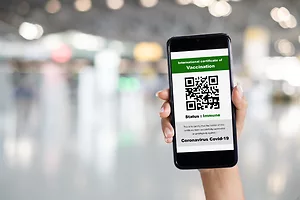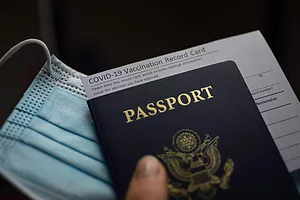The Visa Bulletin is released monthly by the Department of State and is used to determine when a sponsored foreign national can submit the final step of the green card process, or if already pending, when the final step can be adjudicated.
On November 12, 2021, in settling a federal lawsuit pending since March, US Citizenship & Immigration Services agreed to two significant changes that will have a major impact on the lives of nonimmigrant workers and their families in the US.
The Visa Bulletin is released monthly by the Department of State and is used to determine when a sponsored foreign national can submit the final step of the green card process, or if already pending, when the final step can be adjudicated.
As we previously reported, President Biden is rescinding the international travel restrictions that have drastically hindered US business and tourist travel for almost 2 years. Beginning at 12:01 a.m. Eastern Time on Monday, November 8, 2021, travelers will no longer need a valid National Interest Exception if they have been in China, Iran, the Schengen Area, the United Kingdom, Ireland, Brazil, South Africa, or India within the past 14 days. Instead, they – and all air travelers to the US, with some very limited exceptions – will have to prove they are “fully vaccinated” before boarding a US-bound flight.
On October 15, the White House and State Department announced that, beginning November 8, foreign travelers may board US-bound flights or cross US land borders without first obtaining National Interest Exceptions, as long as they can prove they are fully vaccinated against Covid-19.
News sources are reporting that, on September 20, Jeff Zients, White House Covid Response Coordinator, announced easing of restrictions on direct entry into the US by fully vaccinated international travelers. Few details are available as of this writing.
The Visa Bulletin is released monthly by the Department of State and is used to determine when a sponsored foreign national can submit the final step of the green card process, or if already pending, when the final step can be adjudicated.
The Visa Bulletin is released monthly by the Department of State and is used to determine when a sponsored foreign national can submit the final step of the green card process, or if already pending, when the final step can be adjudicated.
Below is a summary of the September Visa Bulletin, including Final Action Dates and changes from the previous month.
The Visa Bulletin is released monthly by the Department of State and is used to determine when a sponsored foreign national can submit the final step of the green card process, or if already pending, when the final step can be adjudicated.
Below is a summary of the August Visa Bulletin, including Final Action Dates and changes from the previous month.
The Visa Bulletin is released monthly by the Department of State and is used to determine when a sponsored foreign national can submit the final step of the green card process, or if already pending, when the final step can be adjudicated.
Below is a summary of the July Visa Bulletin, including Final Action Dates and changes from the previous month.
Search
Recent Posts
Categories
- Adjustment of Status
- Asylum
- Business Immigration
- CBP
- CIS
- Consular Processing
- Court Decisions
- COVID-19
- DED
- Deferred Action
- DHS
- DOL
- E-Verify
- EAD
- Enforcement
- F-1
- Federal Agencies
- Federal Laws/Legislation
- Global Immigration
- H-1B
- H-2B
- Homeland Security
- Humanitarian Relief
- I-9
- ICE
- Immigrant Visas
- L-1
- Labor Certification
- Legislation
- Naturalization
- News & Events
- Nonimmigrant Visas
- Other
- Processing Times
- REAL ID
- Refugees
- SSA
- State Department
- State Laws/Legislation
- TN
- TPS
- US Embassies
- USCIS
- Visa Lottery
- Visa Waiver Program
- Waivers
- Workplace Enforcement
Tags
- AC21
- ACA
- ACWIA
- Adam Rosser
- Adjustment of Status
- Adjustment of Status Applicant
- Adoption
- Advance Parole
- Agencies
- AILA
- Air Travel
- Alien Registration Requirement
- Application Service Centers
- Appropriations
- Arizona
- Asia
- Asylee
- Asylum
- Attorney General
- Awards
- B-1 Business Visitor
- B-1/B-2
- B-2 Tourist
- BALCA
- Biometrics
- Blanket L-1
- Board of Immigration Appeals
- Bob Quackenboss
- Brazil
- Brett Burns
- Brexit
- BRIDGE ACT
- Business Existence
- Business Immigration
- Business Immigration; USCIS; National Interest Waiver; labor certification
- Business Travel
- Buy American Hire American
- California
- Canada
- Cap
- Cap-Exempt
- Cap-Subject
- CARES Act
- CBP
- CDC
- Certification
- Chad
- Chaffetz
- Chambers USA
- Change In Location
- Change In Work Site
- Charities
- China
- Chris Pardo
- Citizenship
- Compliance
- Consular Processing
- Controlled Technology
- Coronavirus/COVID-19
- Court
- Covid test
- CPT
- Current Events
- Customer Identity Verification
- Customs and Border Protection
- DACA
- Decisions
- DED
- Deemed Export
- Deferred Action
- Deferred Inspection
- Department of Homeland Security
- Department of Justice
- Department of Labor
- Department of State
- DHS
- Diversity Visa
- Diversity Visa Lottery
- DOL
- DOMA
- Domestic Violence
- Donald Trump
- DOS
- DREAM Act
- Driver License
- DS-160
- DV Lottery
- DV-2019 Dates
- E visa
- E-1
- E-2
- E-2 investors
- E-2 Spouse
- E-2 Visas
- E-3
- E-3 Australians
- E-3 Spouse
- E-Verify
- E13
- E21
- EAD
- EADs
- EAR
- Earthquake
- EB-1
- EB-1 Backlog
- EB-2
- EB-3
- EB-5
- Ecuador
- El Salvador
- Electronic System for Travel Authorization
- Embassy
- Emily Burkhardt Vicente
- Employer
- Employment Authorization
- Employment Eligibility Verification
- Employment-Based Immigration
- ESTA
- ETIAS
- European Union
- eVerify
- Executive Order
- Executive Orders
- Exempt Employee
- Export
- Export License
- F-1
- Fairness for High Skilled Immigrants Act
- Family
- Family Relationships
- FAR
- Federal
- Federal Acquisitions Regulation
- Federal Contracts
- Federal Law
- Fees
- Filing Fees
- Fingerprinting
- Fingerprints
- Fiscal Year 2016
- Foreign Grads
- Form 140
- Form I-9
- Form I-944
- Form Updates
- Fourth Circuit
- France
- Fraud Detection and National Security Directorate
- Full Vaccination
- Furlough
- FY15
- FY2017
- FY2020
- Georgia
- Global Entry
- Global Mobility
- Golden Arrow
- Grace Period
- Green Card
- Greg Robertson
- Guam
- Guinea
- H-1B
- H-1B Cap
- H-1B Registration
- H-1B Workers
- H-1B1
- H-2
- H-2B
- H-4
- H-4 EAD
- H-4 Spouse
- H-4 Spouses
- Haiti
- Hawaii
- Help HAITI Act
- HIV
- Holly Williamson
- Homeland Security
- Honduras
- HR 1044
- Humanitarian Relief
- Hunton Andrews Kurth
- I-129
- I-140
- I-20
- I-485
- I-539
- I-601A
- I-765
- I-9
- I-94
- I-94 Automation
- Ian Band
- ICE
- iCert
- Identification Document
- Illinois
- Immediate Relatives
- Immigrant
- Immigrant Investor Program
- Immigrant Visa
- Immigrant Visas
- Immigration
- Immigration & Customs Enforcement
- Immigration in Sports
- Immigration News
- Immigration Uncertainty
- India
- Infopass
- International Offices
- Interns
- interview
- Interview Appointment
- Iran
- Iraq
- IRCA
- ITAR
- J-1
- Japan
- Josefina Augusto
- Juan Enjamio
- Kurt Larkin
- Kurt Powell
- L Visa
- L-1
- L-1 Intracompany Transferees
- L-1B
- L-2
- L-2 Spouse
- Labor
- Labor Certification
- Labor Market Test
- LCA
- Legal 500
- Legal Resident Aliens
- Legislation
- Liberia
- Liberian Nationals
- Libya
- License
- Limited Vaccine Availability
- Litigation
- Liya Green
- Lottery
- LPR
- M-1
- M-274
- M. Brett Burns
- Maryland
- Matter of A-B-
- Medical Exams
- Mexico
- Multinational Manager
- N-400
- NAFTA
- National Interest Exception
- National Interest Waiver
- National Labor Relations Board
- National Law Journal
- National Prevailing Wage Center
- National Visa Center
- Naturalization
- Natz
- Nepal
- New York
- News & Events
- NEXUS
- Nicaragua
- Nicaraqua
- Ninth Circuit
- NIV
- NLRB
- No-Match
- Nonimmigrant
- Nonimmigrant Visas
- Nonresident Alien
- North Korea
- Northern Mariana Islands
- NTA
- NVC
- O visa
- O-1
- Office Closures
- OPT
- Oregon
- P-1
- Passport
- Pérez v. Pérez
- PERM
- Permanent Residents
- Policy
- Portability
- Practical Training
- Preclearance
- Preflight Inspection
- Premium Processing
- Prescreening
- Presidential Proclamation
- Prevailing Wage Request
- Priority Date
- Pro Bono
- Processing Times
- Prohibited Entry
- Prosecutorial Discretion
- Provisional Waivers
- Public Access Files
- Public Charge
- REAL ID
- Reciprocity
- Recognitions
- Recovery Rebate
- Reducing Salary
- Refugee
- Refugees
- Registry
- RFE
- Rugby
- Ryan Glasgow
- Safe-Harbor
- Same-Sex
- Satisfactory Departure
- SAVE Jobs USA
- Scott Nelson
- SCOTUS
- Section 1
- Selective Service
- SENTRI
- Sessions
- Shaena Rowland
- Sierra Leone
- Social Media
- Somalia
- South Sudan
- Special Events
- State Department
- State Law
- Stateside Waivers
- STEM OPT
- Stepchildren
- Stephen Pattison
- Sudan
- Supplementary Lottery
- Supreme Court
- Syria
- Tax Credit
- Temporary Visas
- Terence Connor
- Texas
- TN
- TN visa
- TPS
- Tracker 8
- Trailblazer
- Trainees
- Transit Without a Visa
- Travel
- Travel Ban
- Travel Bonds
- Travel Restrictions
- Trump Administration
- Trusted Traveler
- Tsunami
- U Visa
- U.S. Customs & Border Protection
- U.S. Department of State
- U.S. Embassies
- Ukraine
- UN
- Unemployment
- Unemployment Benefits
- Unfair Labor Practices
- Unlawful Presence
- US Citizenship and Immigration Services
- US Customs and Border Protection
- US Department of State
- US Embassy
- US passports
- US Travel Ban
- USCBP
- USCIS
- USD140
- USD150
- USD390
- Vaccine Passport
- Venezuela
- VIBE
- Visa
- Visa Bond
- Visa Bulletin
- Visa Control
- Visa Lottery
- Visa Revalidation
- Visa stamp
- Visa Waiver
- Visa Waiver Program
- Visas
- Visitor Visas
- VWP
- Wait Times
- Waivers
- Webinar
- Whistleblower
- WHO
- Windsor v. United States
- Work Authorization
- Work Permits
- Work Search
- Worksite Enforcement
- Worksite Inspection
- World Health Organization
- Yemen




